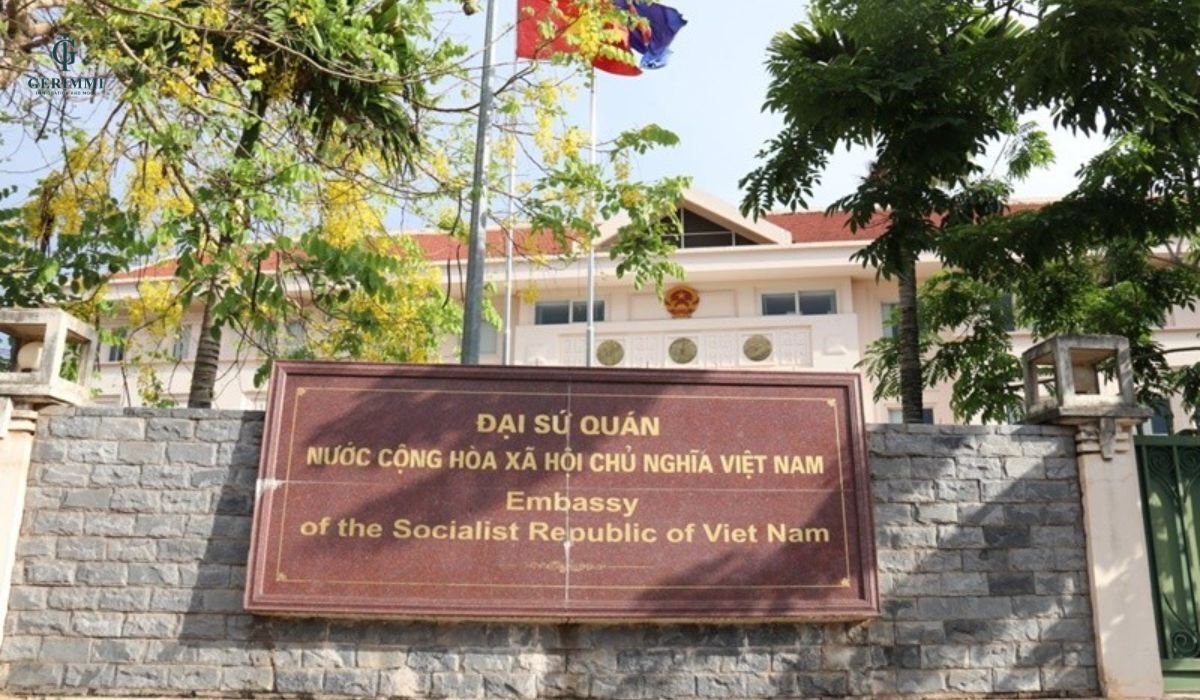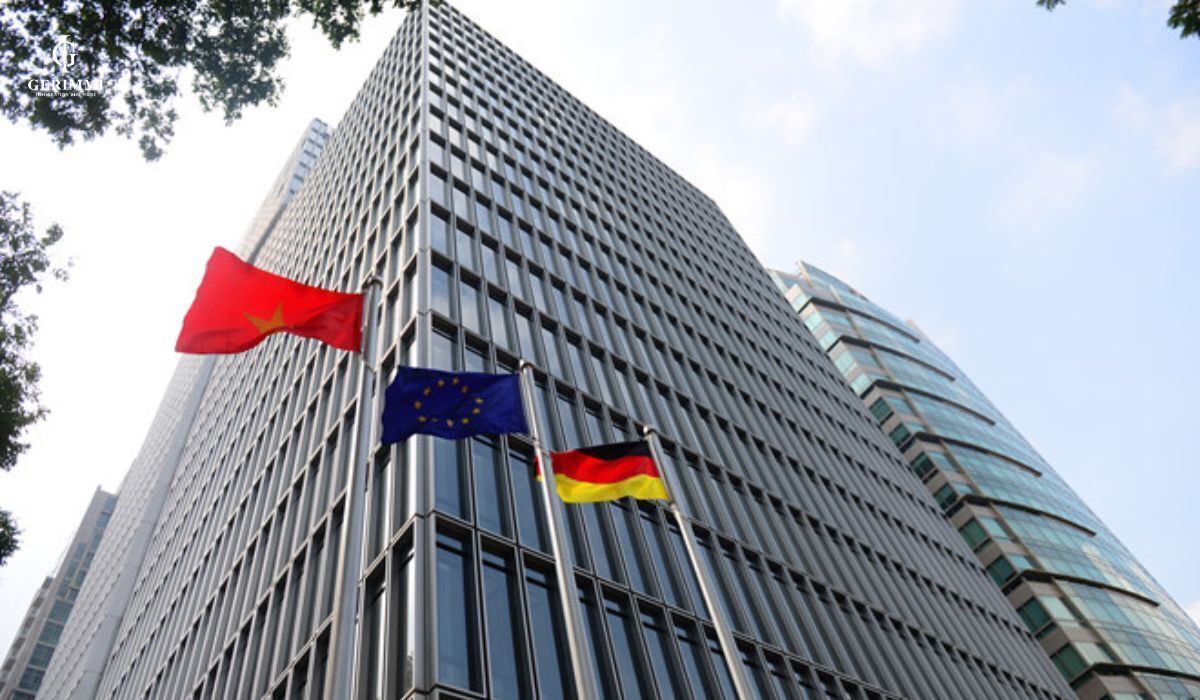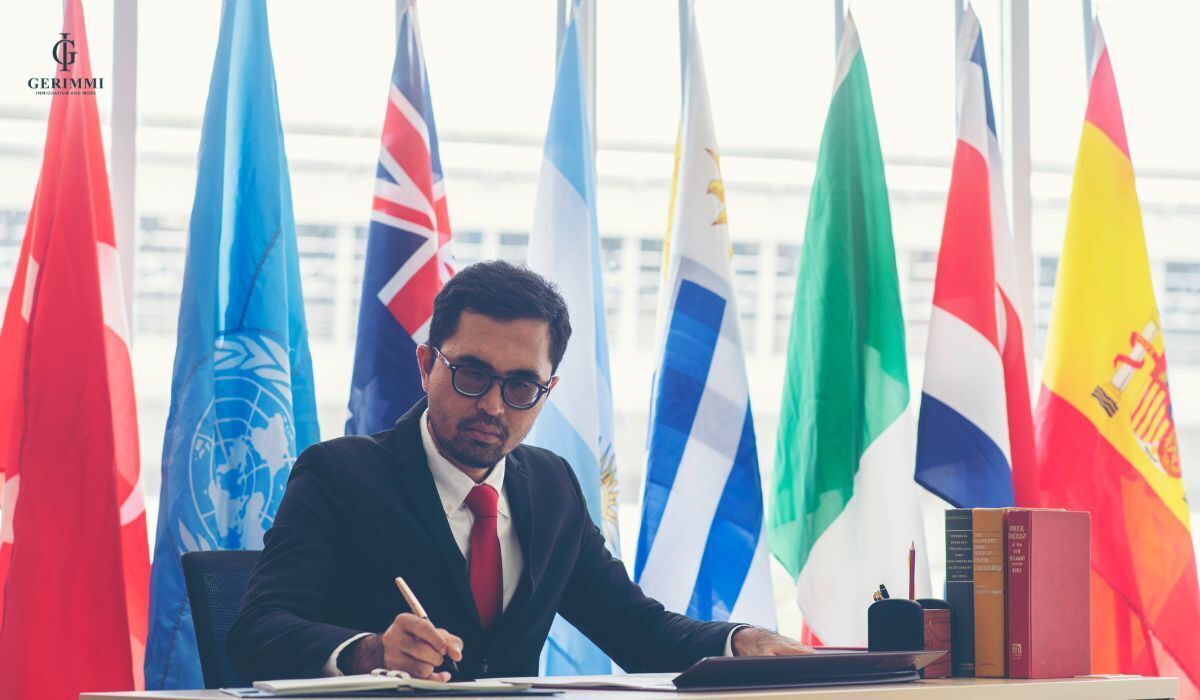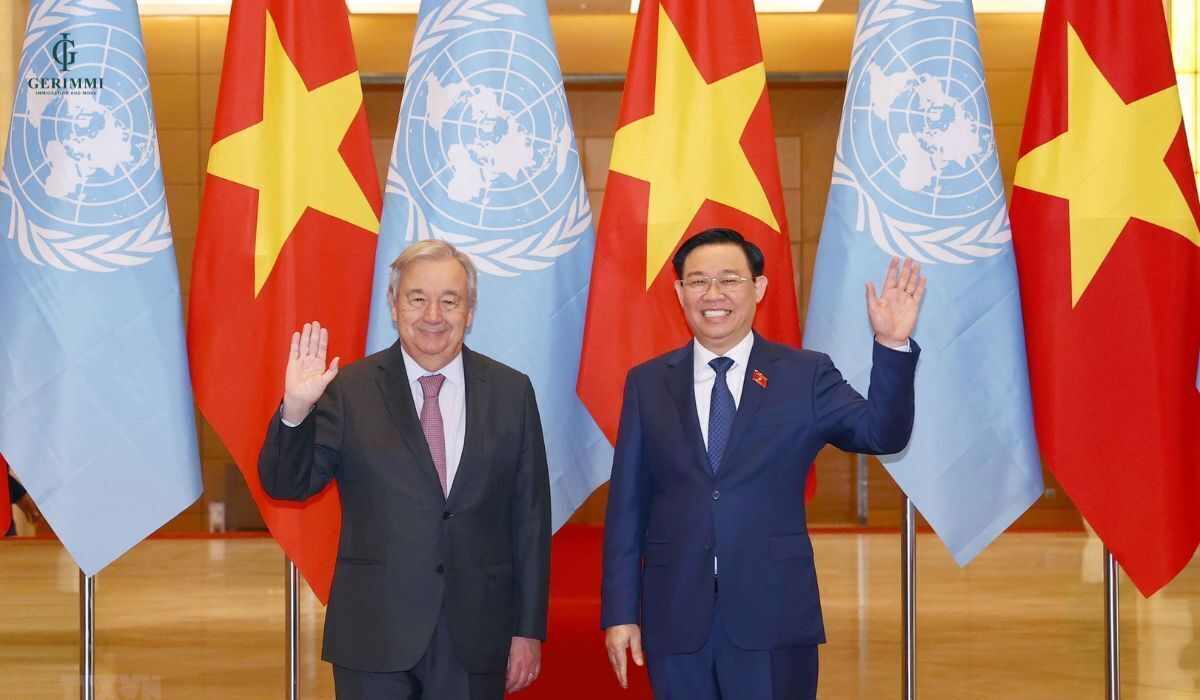Do you know the difference between an Embassy and a Consulate? These are two diplomatic agencies that are often confused, but they play very different roles in maintaining international relations and protecting citizens. This article will help you have the most comprehensive and accurate view, so that you no longer confuse these two important concepts.
I. What is an embassy?
Have you ever wondered what an Embassy is and why it is important? Simply put, an Embassy is the official and highest representative body of a country in another country. Their main goal is to maintain and develop strong diplomatic relations between the two countries.
1. Concept
The embassy is located in the capital of the host country. The head of the office is the Ambassador, who is appointed directly by the head of state (President or King/Queen). The Ambassador and the diplomatic staff working here enjoy diplomatic immunity according to the Vienna Convention on Diplomatic Relations.
This position is not only symbolic but also carries great political power. Under international law, embassies and diplomatic officials enjoy diplomatic immunity, ensuring they can carry out their duties independently and effectively.

2. Main functions
- Maintaining Diplomatic Relations
This is the core function. The Embassy is the direct link between the two governments, responsible for promoting and maintaining bilateral diplomatic relations in all areas: political, economic, cultural and security. All major policy negotiations, agreements and important exchanges are conducted through this channel.
- Represent and protect interests
The embassy represents the interests of its country throughout the territory of the host country. This includes protecting the legitimate rights of its citizens, organizations and businesses in the event of disputes or complex issues.
- Supervision and direction
The Embassy has the right to supervise and direct the activities of its subordinate Consulates. All activities of the Consulate must comply with the general policies of the Embassy.
3. Service objects
Embassies work directly with government officials, authorities and international organizations. However, they also serve citizens when there are serious issues related to foreign policy or national security, such as political crises or natural disasters.
For routine administrative matters such as visa or paperwork, citizens are often instructed to work with the Consulate to ensure the process is quicker and more efficient.
II. What is a consulate?
If the Embassy is the diplomatic brain, then the Consulate is the "extended arm" serving the people, providing practical and close services. So, what is a Consulate and how are they different from an Embassy?
1. Concept
A Consulate is an official representative body of a country, but at a lower level than an Embassy. Instead of being located in the capital, Consulates are often established in large cities, economic centers or areas with many overseas Vietnamese living.
A country has only one Embassy, but can have many Consulates depending on the needs and level of bilateral relations. The head is the Consul General or Consul, responsible for a specific geographical area, called the consular district.

2. Main functions
- Citizen protection:This is the most important function. Consulates act as a “home away from home” for their citizens abroad. They help in emergencies such as lost documents, accidents, arrests, or legal problems. They ensure that the rights and safety of their citizens are respected.
- Administrative services:This is where you go to do your paperwork. The consulate is authorized to issue and renew visas, passports, birth certificates, marriage certificates, and other legal documents.
- Promoting trade and culture:In addition, the Consulate also has the task of introducing the culture and promoting tourism of their country. They organize events, exhibitions, seminars to promote trade, call for investment and enhance people-to-people exchanges.
3. Service objects
Consulates serve both their own citizens and the citizens of the host country. If you are a citizen of the host country and want to apply for a tourist, student or business visa, the Consulate is the place to go.
Similarly, if you are a citizen of that country living abroad and need to renew your passport or deal with any paperwork related issues, the Consulate will be the one to provide you with direct service.
III. Distinguishing between embassies and consulates
|
Criteria |
Embassy |
Consulate |
|
Location |
National capital receiving |
Major cities, economic and cultural centers, near overseas communities |
|
Main function |
Representing the nation in politics, diplomacy, economics, culture, and defense |
Visa, passport, citizen protection, legal assistance, consular services |
|
Service objects |
Local government, international organizations, other diplomatic agencies |
Citizens, businesses, organizations of their own country and local people need procedures |
|
The head |
Ambassador Extraordinary and Plenipotentiary |
Consul General or Consul |
|
Scope of operations |
All receiving countries |
Designated area/area within the receiving country |
|
Role in international relations |
Establish and promote diplomatic, political and bilateral cooperation relations |
Support people-to-people exchanges, local trade, and protection of citizens abroad |
|
Nature of authority |
Has the highest authority, representing the nation in political relations |
Administrative, legal, civil, non-political powers |
IV. The role and significance of the Embassy in international relations
The Embassy occupies a central position in international diplomacy, playing a fundamental role in building, maintaining and developing relations between two countries. Not only an administrative agency, the Embassy is also a symbol of national sovereignty and power.
- Supreme representative of the nation
An embassy is the representation of a country on the territory of the host country. Its presence means that both sides officially recognize each other's sovereignty and diplomatic relations. The diplomatic immunity that the embassy enjoys clearly reflects this special status.
- Official channels of negotiation and communication
All strategic issues, from signing cooperation agreements, discussing international policies, to handling conflicts or crises, are implemented through the Embassy. This is the focal point to help the two countries maintain effective dialogue and cooperation.
- Tools to promote national interests
The embassy is responsible for protecting and promoting the overall interests of the country, including political, economic, defense, cultural and educational. It also plays an important role in facilitating domestic businesses to expand into international markets.
- Building national image and position
Through cultural and educational activities, people's diplomacy and communications, the Embassy contributes to strengthening the national brand, enhancing prestige and soft power in the international arena.

V. The role and significance of the Consulate in international relations
Although the Consulate does not directly undertake high-level diplomatic tasks like the Embassy, it is a close and practical support for citizens and businesses. This role contributes significantly to building trust, maintaining stability and strengthening friendly relations between countries.
- Bridging local culture and economy
Consulates organize exchange events, seminars, exhibitions to promote the culture, education, tourism and economic potential of their country. This is a direct way to connect the local community with the country represented.
- Citizen protection and support
The focus of the Consulate is to protect the legitimate rights of citizens and legal entities. From issuing passports, visas, administrative documents, to support in case of legal problems, accidents or emergencies, the Consulate brings peace of mind to people living, studying and working abroad.
- Contribute to the stability of bilateral relations
By promptly resolving civil and commercial issues, the Consulate contributes to maintaining stable and harmonious relations. These activities create goodwill and a solid foundation for long-term cooperation between the two countries.
- Support regional economic and trade development
Located in major cities, Consulates often focus on promoting trade, investment, tourism and educational cooperation at the local level, complementing the Embassy's macro foreign policy.
- Connecting overseas Vietnamese communities
In addition to its administrative functions, the Consulate also organizes many community activities, creates a living environment and supports associations, thereby helping people far from home maintain their identity and connect more closely with the country.

VI. Frequently asked questions
1. Where should I go to apply for a visa?
To apply for a visa, you usually go to the Consulate of the country you want to enter. If there is no Consulate where you live, the application will be submitted to the Embassy in the capital, through the consular section. The basic process includes filling out the application, preparing documents (passport, photos, financial proof, itinerary...) and waiting for approval.
2. Who to contact if you have problems with your passport or documents?
When your passport is lost or expired, or you need administrative documents such as birth, marriage, or notarization certificates, you should contact the Consulate. If there is no Consulate in your area, please go to the consular section of the Embassy for assistance.
3. When should I contact the Embassy?
The Embassy handles high-level diplomatic matters and protects citizens in crises such as war, natural disasters, and epidemics. In addition, if the country you are in does not have a Consulate, all passport, visa, and citizen protection procedures will be handled by the Embassy.
Conclusion
Hopefully, with the detailed information above, you can confidently distinguish between an Embassy and a Consulate. Each agency has its own position and meaning, which cannot be replaced. Understanding their functions correctly will not only help you handle procedures effectively but also open up a deeper insight into the world of diplomacy.

